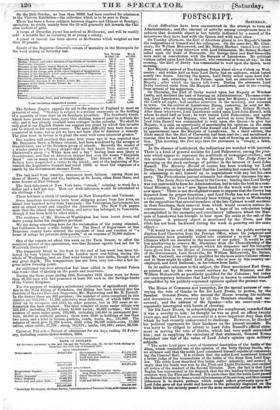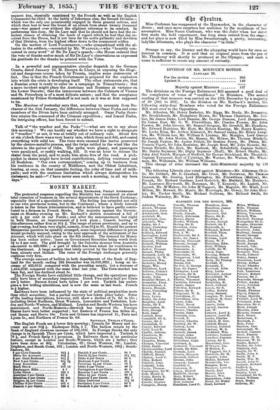The House of Commons met yesterday, for the special purpose
of con. veying the vote of thanks to Sir De Lacy Evans, in person, by the Speaker. General Evans, who entered the House wearing his uniform. and decorations, was received by all the Members standing and en. covered ; and the address of the Speaker—who sat uncovered—was repeatedly interrupted with bursts of cheering. Sir DE Lees EVANS, in acknowledging the compliment, remarked that it was a novelty to him : he thought he was as good an officer twenty years ago, and had been as successful in a more important duty than that which he had recently endeavoured to discharge. However, he thanked his political opponents for their kindness on the present occasion. He was sorry to be obliged to advert to Lord John Itussell's official stilts: ment in moving the vote of thanks, which had very much astonished him ; and in supplying the omissions of that statement, General Evans furnished one test of the value of Lord John's opinion upon military. subjects. " The noble Lord gave a sort of theatrical description of the battle ages Alma, which reminded one of the opinion of the witty Sydney Smiths who we all know said that the noble Lord considered himself capable of command* in the Channel fleet. It is evident that the noble Lord considered himself a better judge of the transactions of the battle of the Alma than Lord Rag- len. The noble Lord described this battle rather minutely, and seemed to imply that the battle was won by the First and Light Divisions, and omitted all notice of the conduct of the Second Division. Now, the fact is that Lord Raglan has represented in his despatch that the two leading divisions on that occasion were the First and Second. It is quite clear that the noble Lord passed the Second Division by from a total obliviousness of its services, and thus caused inferences to be drawn perhaps which might reflect grievously upon Lord John gave all due credit and honour to the gallantry displayed on the 25th October, but entirely passed over the more successful satire car the eel..
sequent day, especially mentioned by the French, as. well. ae the English Commander-in-chief. At the battle of Inkerman also, the Second Division— which was the only one prominently engaged in three general actions, and which then had to bear the brunt of an attack from about twenty thousand men—was passed over without the slightest reference to its conduct. In performing this duty, Sir De Lacy said that he should not have had the re- motest chance of obtaining the mark of regard which he had that day re- ceived from the House, had it not been for the noble gallantry and devotion of that Division, from the highest officer down to the commonest soldier.
On the motion of Lord PAtatxasTox,—who sympathized with the al- lusion to the soldiers,—seconded by Mr. WALPOLE,—who "heartily con- curred in every word" of Sir De Lacy's speech,—the House ordered that the vote of thanks and so much of Sir De Lacy's observations as expressed his gratitude for the thanks be printed with the Votes.



























 Previous page
Previous page